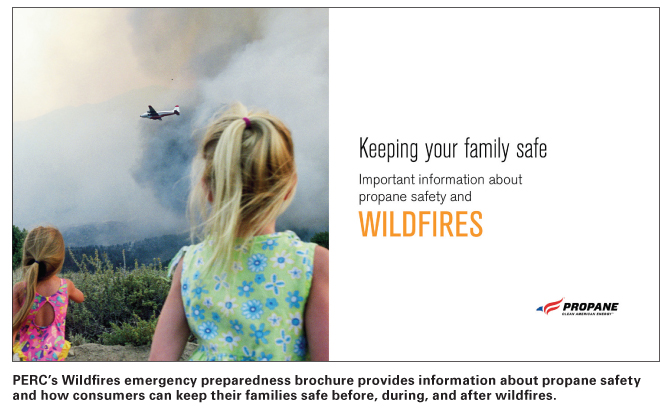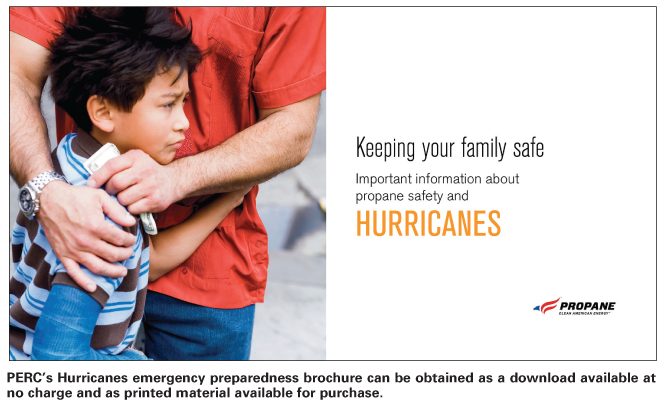Thursday, January 17, 2019
The wildfires and hurricanes recently seen in different parts of the country have reminded propane marketers and consumers alike that the best time to get ready for a disaster is before it happens. 
To make that task easier, the Propane Education & Research Council (PERC) offers a number of resources that provide information and best practices for preparing for and responding to an emergency. Resources are available tailored to consumers, marketers, and first responders.
Among these resources are materials available in print or electronic format, an upcoming conference focused on safety and training, and a presentation that reminds marketers about the dangers of complacency.
“We know how important this is,” Stuart Flatow, vice president of safety and training at PERC, told BPN. “It seems natural disasters are becoming more common. We would like people to be proactive, because during an incident is not the time to contact PERC or marketers to learn how to deal with it.”
PERC’s Resource Catalog includes downloads available at no charge as well as printed materials available for purchase. Propane safety resources include brochures, direct mailers, fact sheets, FAQs, manuals, photography, posters, print ads, radio ads, training, videos, and web content. There’s also a Consumer Safety Preparedness Campaign Bundle. Among these resources is a series of Emergency Preparedness brochures with titles focusing on floods, thunderstorms, extreme heat, power outages, earthquakes, wildfires, hurricanes, tornadoes, and winter storms. All PERC resources have been developed to be easy for marketers to use, and to deliver a consistent message to consumers. These and other resources are available in the Resource Catalog at propane.com.
“Send them to customers to be proactive,” Flatow suggested. “Maybe say, ‘This is Joe from ABC Propane. A storm is forecast, please see this to learn what to do before, during, and after.’”
“Put your company’s logo on PERC safety modules and talk about safety while you promote your business,” he added. “A month before the season, send the relevant material out. It can say: ‘We want you to be safe; here are some tips. By the way, this Saturday we are having a sale on 20-pound cylinders.’”
The resources for consumers cover many safety messages that are important for customers to hear. Among them: Contact your propane supplier ahead of time, so you don’t run out of gas at a time when it may be difficult for the supplier to get to you. If there is an evacuation order, shut off your system, but make sure it isn’t turned on until it is inspected by a propane professional. The materials also include information like how large a circumference of brush consumers should clear away from a tank; what consumers should do if they smell gas; and how consumers can avoid carbon monoxide poisoning.
“Sometimes we think this is common sense, but for those who are not propane professionals, it’s not,” Flatow said. “We think, ‘Who would bring a gas grill indoors?’ But some people do. Generators too. So, it is important to educate our customers.”
“We also need to remind them that whenever there is an interruption of service, they need to have their system checked out,” he added. “Consumers may not know that. It’s important that they be educated on that so that they know that when a professional says they need to inspect the system, the consumer knows they’re not just doing it to make money — it’s code. The customer will appreciate that.”
PERC will also facilitate the sharing of information, experience, ideas, and best practices at the National Safety & Trainer’s Conference that is to be held Jan. 9-10, 2019, in San Antonio, Texas. Designed for state association executives, safety trainers, safety professionals responsible for safety and compliance, and anyone that has a stake in advancing workforce safety and training in the propane industry, this year’s conference will focus on safety issues. One of the topics on the agenda is, “Preparing Employees and Customers for Natural Disasters,” featuring a panel of professionals who have been through these events. For information and to register to attend, visit https://tinyurl.com/yc6anmdb.
“Through our publications, we have shared tips for propane companies for dealing with natural disasters,” said Gregg Walker, director of communications at PERC. “We have talked with people who have gone through a disaster, about what they experienced and how others can prepare.”
For propane professionals, preparation includes things like arranging for crisis communications, parking bobtails on high ground, preventing employees from coming to work when they shouldn’t, planning evacuation routes, weatherizing vehicles, and clearing routes for first responders.
“There are a lot of things companies have to plan for,” Flatow said. “We want to plan for these things ahead of time.”
“Marketers and customers alike should reach out to local fire stations with ‘what if’ scenarios,” he added. “What happens if we have to reach out to a first responder? What do we do if there is an incident? What can we do to make your job of saving us easier?”
“It’s like insurance; you hope you don’t use it, but you plan ahead,” Flatow concluded. “Let’s not count on luck; let’s count on planning.”
Another resource offered by PERC is a presentation on complacency and the risk it presents to propane marketers. Walker has delivered this presentation at meetings of the industry’s state associations. It covers complacency in terms of safety and other aspects of the propane industry.
“A marketer once told me, ‘We work with propane every day, we got complacent, and we had an incident,’” Walker said. “My presentation also covers complacency regarding promoting the industry. Too often we don’t do that if the phones have been ringing.
“You get accustomed to the normal pace of things,” he added. “Then, when we get caught off guard, we think, ‘If only I had planned ahead.’” —Steve Relyea

To make that task easier, the Propane Education & Research Council (PERC) offers a number of resources that provide information and best practices for preparing for and responding to an emergency. Resources are available tailored to consumers, marketers, and first responders.
Among these resources are materials available in print or electronic format, an upcoming conference focused on safety and training, and a presentation that reminds marketers about the dangers of complacency.
“We know how important this is,” Stuart Flatow, vice president of safety and training at PERC, told BPN. “It seems natural disasters are becoming more common. We would like people to be proactive, because during an incident is not the time to contact PERC or marketers to learn how to deal with it.”
PERC’s Resource Catalog includes downloads available at no charge as well as printed materials available for purchase. Propane safety resources include brochures, direct mailers, fact sheets, FAQs, manuals, photography, posters, print ads, radio ads, training, videos, and web content. There’s also a Consumer Safety Preparedness Campaign Bundle. Among these resources is a series of Emergency Preparedness brochures with titles focusing on floods, thunderstorms, extreme heat, power outages, earthquakes, wildfires, hurricanes, tornadoes, and winter storms. All PERC resources have been developed to be easy for marketers to use, and to deliver a consistent message to consumers. These and other resources are available in the Resource Catalog at propane.com.
“Send them to customers to be proactive,” Flatow suggested. “Maybe say, ‘This is Joe from ABC Propane. A storm is forecast, please see this to learn what to do before, during, and after.’”

“Put your company’s logo on PERC safety modules and talk about safety while you promote your business,” he added. “A month before the season, send the relevant material out. It can say: ‘We want you to be safe; here are some tips. By the way, this Saturday we are having a sale on 20-pound cylinders.’”
The resources for consumers cover many safety messages that are important for customers to hear. Among them: Contact your propane supplier ahead of time, so you don’t run out of gas at a time when it may be difficult for the supplier to get to you. If there is an evacuation order, shut off your system, but make sure it isn’t turned on until it is inspected by a propane professional. The materials also include information like how large a circumference of brush consumers should clear away from a tank; what consumers should do if they smell gas; and how consumers can avoid carbon monoxide poisoning.
“Sometimes we think this is common sense, but for those who are not propane professionals, it’s not,” Flatow said. “We think, ‘Who would bring a gas grill indoors?’ But some people do. Generators too. So, it is important to educate our customers.”
“We also need to remind them that whenever there is an interruption of service, they need to have their system checked out,” he added. “Consumers may not know that. It’s important that they be educated on that so that they know that when a professional says they need to inspect the system, the consumer knows they’re not just doing it to make money — it’s code. The customer will appreciate that.”
PERC will also facilitate the sharing of information, experience, ideas, and best practices at the National Safety & Trainer’s Conference that is to be held Jan. 9-10, 2019, in San Antonio, Texas. Designed for state association executives, safety trainers, safety professionals responsible for safety and compliance, and anyone that has a stake in advancing workforce safety and training in the propane industry, this year’s conference will focus on safety issues. One of the topics on the agenda is, “Preparing Employees and Customers for Natural Disasters,” featuring a panel of professionals who have been through these events. For information and to register to attend, visit https://tinyurl.com/yc6anmdb.
“Through our publications, we have shared tips for propane companies for dealing with natural disasters,” said Gregg Walker, director of communications at PERC. “We have talked with people who have gone through a disaster, about what they experienced and how others can prepare.”
For propane professionals, preparation includes things like arranging for crisis communications, parking bobtails on high ground, preventing employees from coming to work when they shouldn’t, planning evacuation routes, weatherizing vehicles, and clearing routes for first responders.
“There are a lot of things companies have to plan for,” Flatow said. “We want to plan for these things ahead of time.”
“Marketers and customers alike should reach out to local fire stations with ‘what if’ scenarios,” he added. “What happens if we have to reach out to a first responder? What do we do if there is an incident? What can we do to make your job of saving us easier?”
“It’s like insurance; you hope you don’t use it, but you plan ahead,” Flatow concluded. “Let’s not count on luck; let’s count on planning.”
Another resource offered by PERC is a presentation on complacency and the risk it presents to propane marketers. Walker has delivered this presentation at meetings of the industry’s state associations. It covers complacency in terms of safety and other aspects of the propane industry.
“A marketer once told me, ‘We work with propane every day, we got complacent, and we had an incident,’” Walker said. “My presentation also covers complacency regarding promoting the industry. Too often we don’t do that if the phones have been ringing.
“You get accustomed to the normal pace of things,” he added. “Then, when we get caught off guard, we think, ‘If only I had planned ahead.’” —Steve Relyea

